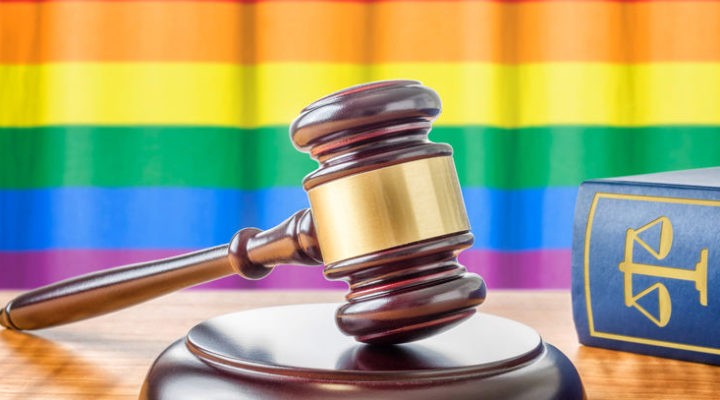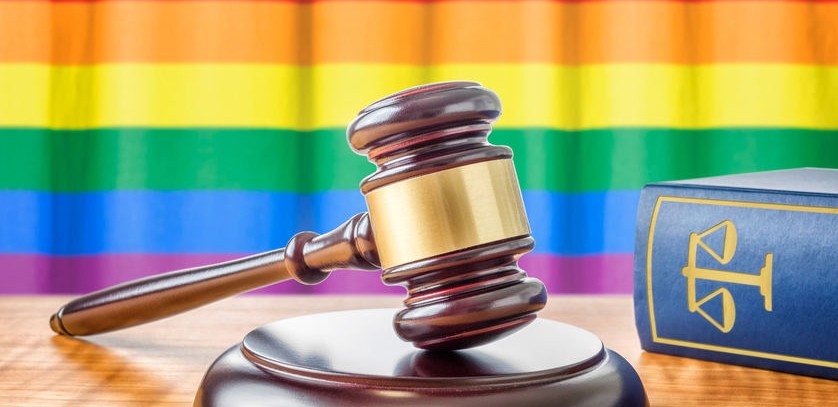While members of the LGBTQ community and their allies expressed fear and outrage over the rushed appointment of Amy Coney Barrett to the U.S. Supreme Court this week, new polling data shows the American public is on their side — even if a future Supreme Court ruling is not.
Barrett — a staunch conservative Roman Catholic — is widely perceived to be hostile toward same-sex marriage, which was legalized nationwide by the Supreme Court’s landmark Obergefell v. Hodges ruling in 2015. In confirmation hearings, Barrett declined to say how she would rule on such an issue were it to come before the court again.
However, when the court opened its new term Oct. 6 — with Barrett’s controversial nomination and hearings hanging in the air — Justices Clarence Thomas and Samuel Alito used the occasion of commenting on another case to voice their objections to Obergefell and suggest it should be re-examined.
“Due to Obergefell, those with sincerely held religious beliefs concerning marriage will find it increasingly difficult to participate in society without running afoul of Obergefell and its effect on other anti-discrimination laws,” Thomas wrote. “It would be one thing if recognition for same-sex marriage had been debated and adopted through the democratic process, with the people deciding not to provide statutory protections for religious liberty under state law. But it is quite another when the court forces that choice upon society through its creation of atextual constitutional rights and its ungenerous interpretation of the Free Exercise Clause, leaving those with religious objections in the lurch.”
A majority of Americans (70%) favor allowing gay and lesbian couples to marry legally.
New data from Public Religion Research Institute shows if Americans had to vote on allowing same-sex marriage, it likely would pass handily. The latest national poll found a majority of Americans (70%) favor allowing gay and lesbian couples to marry legally, compared to only 28% of Americans who oppose it. Majorities of Democrats (80%) and independents (76%), as well as half of Republicans (50%), support same-sex marriage.
White evangelical Protestants are the only major religious group in which a majority opposes allowing same-sex marriage (34% favor, 63% oppose). Majorities in every other major religious group support marriage equality, including 90% of religiously unaffiliated Americans, 79% of white mainline Protestants, 78% of Hispanic Catholics, 72% of members of non-Christian religious groups, 68% of Hispanic Protestants, 67% of white Catholics, 57% of Black Protestants, and 56% of members of other Christian religious groups.
Further, the poll found, 83% of Americans favor laws that would protect gay, lesbian, bisexual and transgender people against discrimination in jobs, public accommodations and housing, compared to only 16% of Americans who oppose such laws. Majorities of Democrats (94%), independents (85%) and Republicans (68%) favor such nondiscrimination laws.
83% of Americans favor laws that would protect gay, lesbian, bisexual and transgender people against discrimination.
The PRRI data confirms an upward trend acceptance previously noted by Pew Research. Pew noted that in 2004, Americans opposed same-sex marriage by a margin of 60% to 31% but that attitude has rapidly changed. Pew polling in 2019 found 61% of Americans support same-sex marriage, while 31% oppose it.
Gallup polling data also confirms the trend. In June this year, Gallup reported: “Two in three Americans (67%) say marriages between same-sex couples should be recognized by the law as valid, matching the previous high Gallup measured in 2018.”
Added to this debate, Pope Francis last week announced he supports legalizing civil unions for gay couples.
Gallup reports that most U.S. Catholics have believed same-sex unions should be legal since 2011, with Catholics consistently exceeding the national average by five or more percentage points since the 2000s. Gallup’s latest data shows an average of 69% of Catholics supporting same-sex marriage every year since 2016.
Related articles:
You might have missed this, but the Supreme Court just opened a new term


